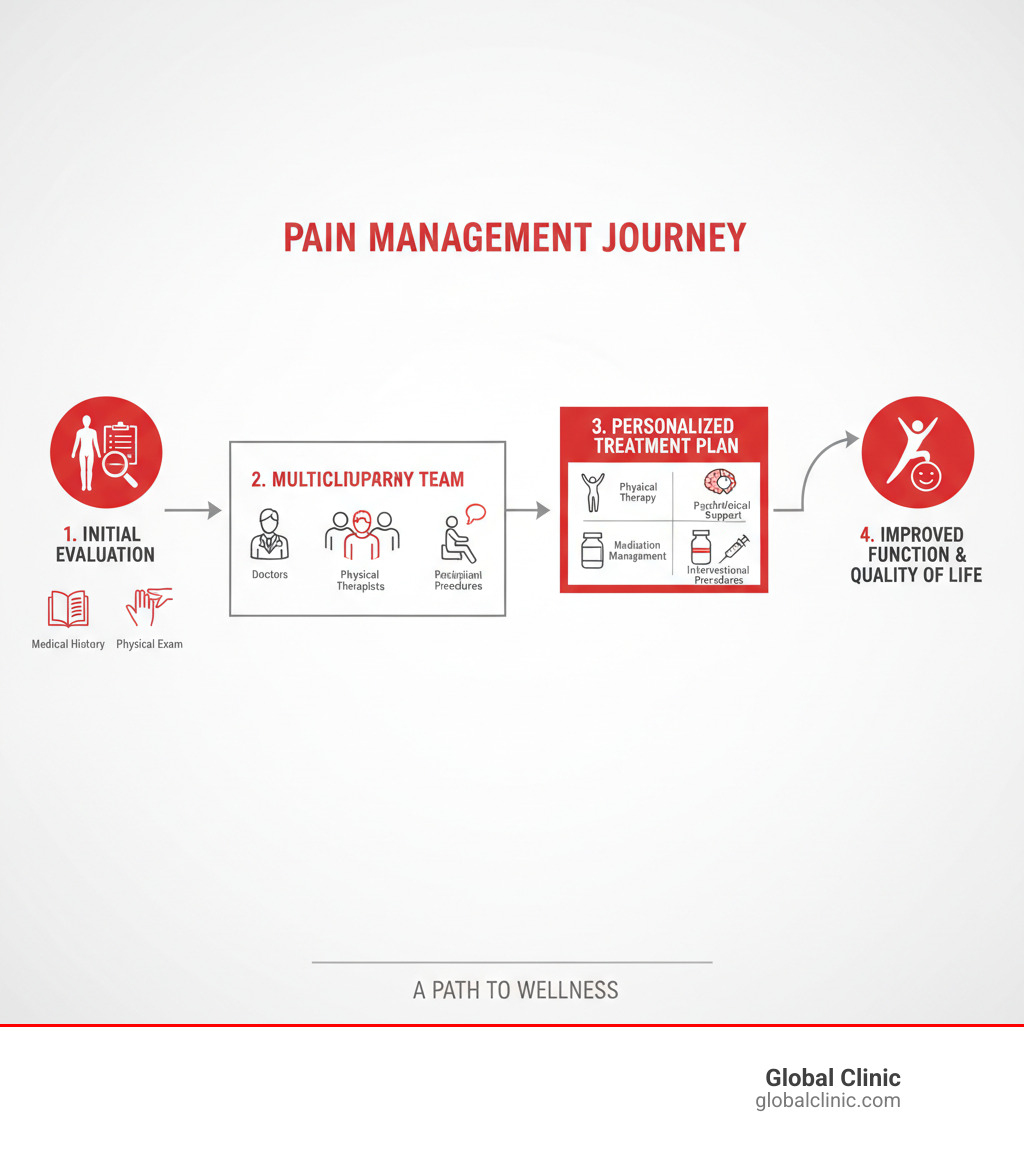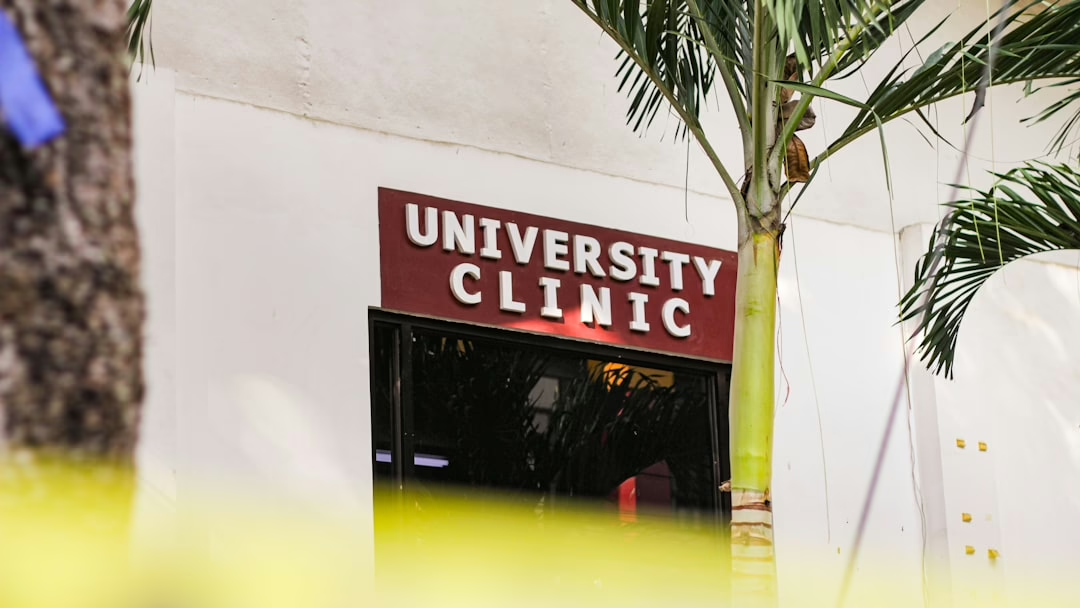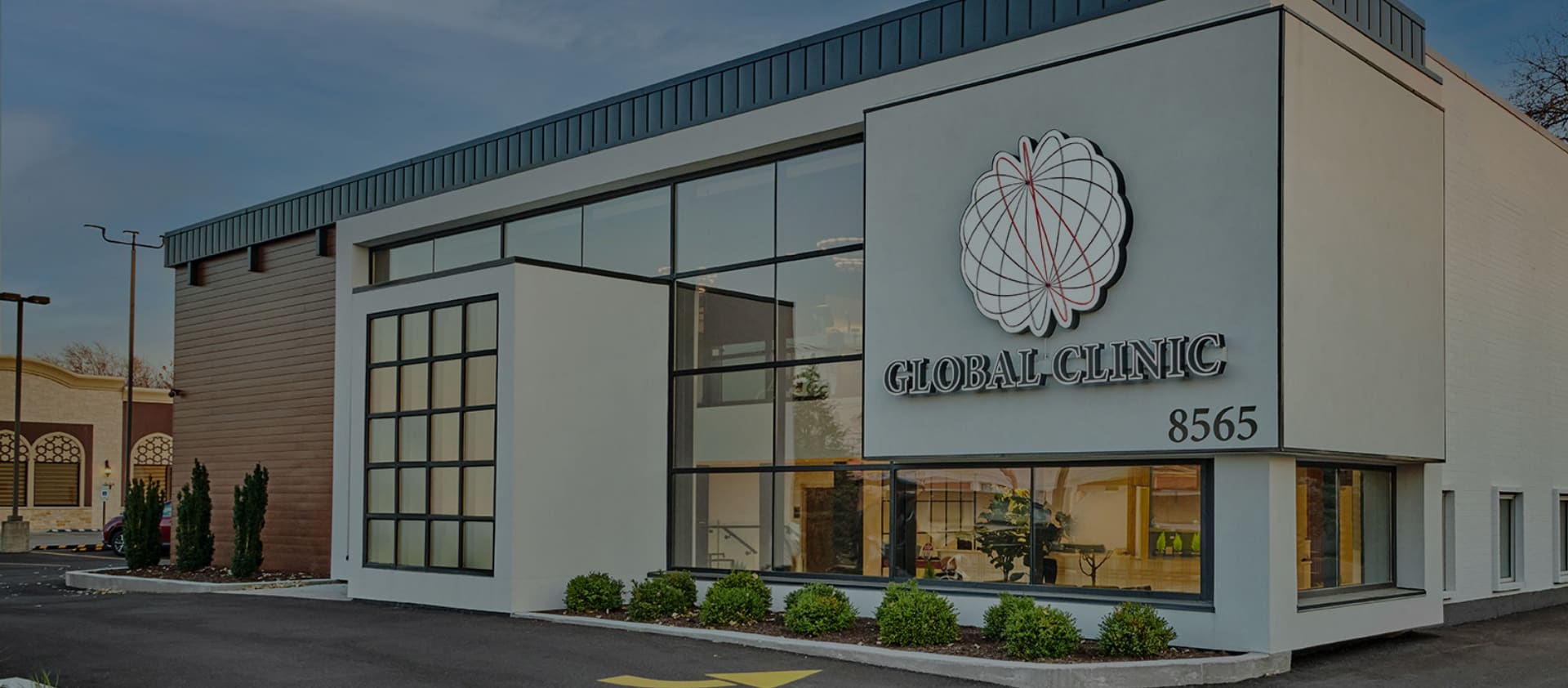Understanding Pain Management Clinics: Your Path to Relief
What are pain management clinics? They are specialized healthcare facilities using a comprehensive, multidisciplinary approach to diagnose and treat chronic pain. Instead of focusing only on medication, these clinics combine various therapies to help patients regain function and improve their quality of life.
Quick Answer:
- Purpose: Diagnose and treat chronic pain with multiple approaches.
- Team: Doctors, physical therapists, and psychologists working together.
- Goal: Improve daily function and quality of life, not just reduce pain.
- Treatments: A mix of physical therapy, psychological support, procedures, and medication management.
- Focus: Teaching patients self-management skills for long-term wellness.
Chronic pain is a widespread issue, affecting over 1.5 billion people globally. It disrupts sleep, work, and relationships, creating a complex cycle of pain and stress. However, studies show that comprehensive pain management leads to less pain and emotional distress, with treatments often resulting in a 30% decrease in pain scores. More importantly, they help people regain control of their lives.
Pain management clinics use a whole-person approach, addressing the physical source of pain and its impact on emotional well-being. I’m Ana Vinikov, Practice Manager at Global Clinic. For over 20 years, we’ve helped patients find relief through innovative, non-surgical treatments, guiding them from chronic pain to renewed function.

Common what are pain management clinics vocab:
What Are Pain Management Clinics and How Do They Work?
When chronic pain persists, a typical doctor’s visit may not be enough. Pain management clinics, also known as pain rehabilitation programs (PRPs), are specialized facilities that offer a different approach. Instead of just prescribing medication, they assemble a team of experts to help you get your life back. The focus is on restoring function and improving your daily life, not just dulling the pain.
The Core Definition: What are pain management clinics?
At Global Clinic, we know chronic pain affects physical health, emotional well-being, and relationships. What are pain management clinics designed to do? They take a holistic approach, looking at how pain impacts every part of your life. A team of specialists—including physicians, physical therapists, and psychologists—works together to coordinate your care.
This collaborative model allows for a deeper diagnosis and treatment of your condition while teaching you valuable self-management skills. We address both the physical and emotional aspects of living with chronic pain, recognizing their deep connection.
Types of Pain Clinics
Not all pain clinics are the same. Understanding the two main types helps you choose the right one for your needs.
Interdisciplinary clinics are the gold standard. They feature a comprehensive care team where physical therapists restore movement, psychologists teach coping strategies, and physicians manage medical treatments. This integrated model is supported by scientific research on interdisciplinary pain management.
Modality-specific clinics (or block clinics) have a more targeted approach. These are often anesthesiologist-led and focus on procedures like injections and nerve blocks. While effective for certain conditions, they typically don’t offer the comprehensive support needed for all aspects of chronic pain.
| Feature | Interdisciplinary Clinics | Modality-Specific (Block) Clinics |
|---|---|---|
| Approach | Holistic, whole-person, integrated | Targeted, procedural |
| Team | Physicians, PT, OT, psychologists, nurses, nutritionists | Anesthesiologists, interventional pain specialists |
| Treatment Range | Broad: therapy, medication, procedures, psychological support | Narrow: injections, nerve blocks, specific procedures |
| Focus | Restoring function, improving quality of life, self-management | Pain reduction in a specific area |
| Patient Profile | Complex chronic pain, widespread pain, emotional impact | Localized pain, specific nerve issues |
At Global Clinic, we use the interdisciplinary approach because chronic pain requires a comprehensive solution.
The Primary Goal: Improving Function and Quality of Life
The main goal of pain management isn’t always to eliminate pain completely. While pain reduction is important, the real focus is on pain management—helping you live a full life even if some discomfort remains.
We concentrate on restoring daily activities that matter to you, like playing with family or returning to work. We teach coping skills for flare-ups and strategies for long-term wellness. We also work on decreasing emotional distress, as anxiety and depression can worsen pain.
This focus on function is central to our philosophy. When patients can re-engage in meaningful activities, their pain often becomes more manageable because it no longer controls their life. Learn more info about our patient-centered approach and how we’ve helped Northern Chicago residents for over two decades.
Conditions Treated and What to Expect During Your Visit
If chronic pain is disrupting your life, a pain management clinic can likely help. What are pain management clinics designed to treat? They cover a wide range of conditions. Most patients arrive via referral from a family doctor, taking an important first step toward comprehensive care.
Common Conditions Addressed
Comprehensive pain management is effective for many types of pain. Since less than 50% of people with neuropathic pain find relief from a single treatment, a multi-layered approach is often more successful. We regularly treat:
- Chronic back pain: From herniated discs or spinal stenosis. We offer proven methods for Addressing Back Pain with Physical Therapy.
- Arthritis: We help patients find ways of Living Comfortably with Knee Arthritis and managing other joint conditions.
- Fibromyalgia: Our team-based approach addresses the widespread pain, fatigue, and mood changes associated with this condition.
- Neuropathic pain: Accurate diagnosis is key for this burning or shooting pain. We distinguish between conditions like Piriformis Syndrome vs. Sciatica to ensure correct treatment.
- Other conditions: We also treat debilitating headaches, migraines, persistent post-surgical pain, Complex Regional Pain Syndrome, and cancer-related pain.
Your First Appointment: A Comprehensive Evaluation
Your first visit is a deep dive to understand both your pain and you. Effective pain management is personal, and this thorough evaluation is what sets quality care apart. The process includes:
- Detailed pain history: We’ll discuss when your pain started, what it feels like, and what makes it better or worse.
- Physical examination: We assess your range of motion, tenderness, and how pain affects your movement.
- Review of past treatments: Bring a list of all medications and therapies you’ve tried. This helps us build on what has worked and avoid what hasn’t.
- Diagnostic tests: We may use X-rays, MRIs, or blood work to identify the root cause of your pain.
- Life impact discussion: We’ll talk about how pain affects your work, sleep, and hobbies to shape your treatment plan.
- Goal setting: Together, we’ll set realistic goals, which become our roadmap for success.
- Personalized treatment plan: We create a plan custom to your condition, lifestyle, and goals.
For tips on preparing for your visit, Pain Concern’s leaflet on managing healthcare appointments offers helpful guidance. This first appointment is the beginning of taking back control from your pain.
A Comprehensive Toolkit: Treatments and Therapies Offered
What are pain management clinics known for? Offering a wide variety of treatments. At Global Clinic, our multidisciplinary team combines evidence-based and innovative therapies, layering approaches to address complex chronic pain.
Interventional Pain Procedures
These precise, targeted interventions are designed to interrupt pain signals at their source.
- Nerve blocks: Use anesthetic to provide a temporary “off switch” for specific nerves.
- Epidural steroid injections: Deliver anti-inflammatory medication directly to the source of inflammation around the spinal cord.
- Radiofrequency Ablation (RFA): The Newest Pain Control Method: Uses radio waves to “turn off” specific pain-carrying nerves for long-lasting relief.
- Peripheral Nerve Stimulation for Treating Chronic Pain: Places tiny electrical leads near nerves to modify pain signals before they reach the brain.
- Spinal cord stimulation: Uses mild electrical impulses to mask pain signals, replacing pain with a tingling sensation.
Physical and Occupational Therapy
Movement is medicine. We help you regain strength and confidence through safe, purposeful activity, which the CDC recommends as an alternative to opioids.
- Physical therapy: Rebuilds strength, improves flexibility, and corrects posture. We specialize in Addressing Back Pain with Physical Therapy and helping patients understand The Benefits of Physical Therapy After a Car Accident.
- Occupational therapy: Helps you adapt daily activities to minimize pain and maximize independence, teaching you to pace activities without overdoing it.
Psychological Support and Mind-Body Techniques
Addressing the emotional toll of chronic pain is crucial. These techniques help manage the frustration, anxiety, and depression that often accompany pain.
- Cognitive Behavioral Therapy (CBT): Helps change negative thought patterns that can worsen pain.
- Mindfulness and relaxation strategies: Teach you to observe pain without judgment and use techniques like deep breathing to calm your nervous system.
- Acceptance and Commitment Therapy (ACT): Helps you live a value-driven life even with pain.
- Biofeedback: Teaches you to control bodily functions like heart rate and muscle tension to influence pain.
Medication Management
Medication can play a supporting role when used responsibly. Our philosophy is to use the lowest effective dose while monitoring for side effects.
- Non-opioid analgesics: Often the first line of treatment.
- Safely tapering opioids: We help reduce dosages, as chronic opioid use can sometimes increase pain sensitivity. We follow the CDC Guideline for Prescribing Opioids for Chronic Pain to minimize risks.
- Goal: Reduce side effects and avoid dependence.
Regenerative and Complementary Medicine
We explore innovative approaches that work alongside traditional treatments.
- PRP Injections: Use your body’s own platelets to promote tissue repair.
- Chiropractice: Restores proper spinal alignment to reduce pain and improve mobility.
- Acupuncture: Stimulates the body’s natural pain-relief mechanisms.
- Massage therapy: Relaxes muscles, improves circulation, and reduces tension.
- NAD IV Therapy: Supports cellular repair, boosts energy, and reduces inflammation for overall well-being.
How to Find a Reputable Pain Management Clinic
Choosing the right pain management clinic is a critical step. You deserve a clinic that understands your struggles and offers genuine solutions. There are clear signs that distinguish excellent clinics from those to avoid.

What to Look For in a Quality Clinic
When researching what are pain management clinics can offer, look for these qualities. They indicate a clinic that prioritizes your long-term well-being.
- Board-certified specialists: Physicians with rigorous, specialized training in pain management.
- An interdisciplinary team: A collaborative group of physical therapists, psychologists, and other specialists working together to address the whole person.
- Focus on diagnosis: A commitment to thorough evaluation before treatment. A reputable clinic invests time in a detailed history, physical exam, and appropriate diagnostic tests.
- Personalized treatment plans: Custom plans custom to your specific condition, lifestyle, and goals, with adjustments made as you progress.
- Emphasis on functional improvement: A priority on restoring your ability to live fully and teaching self-management skills, rather than just eliminating pain.
- A patient-centered approach: An environment where you feel heard, respected, and involved in every decision about your care.
Red Flags: What are pain management clinics to avoid?
Recognizing warning signs can protect you from ineffective or harmful treatment. Avoid clinics with these red flags:
- “Pill mills” or a sole focus on medication: Clinics that primarily offer narcotics without comprehensive therapies often fail to address root causes and can contribute to dependence.
- Lack of comprehensive evaluation: A clinic that offers treatment after only a brief consultation is not providing the careful assessment chronic pain requires.
- A one-size-fits-all approach: Identical treatment plans for every patient show a lack of understanding of the individual nature of pain.
- Promises of a complete “cure”: Reputable clinics set realistic expectations. Be skeptical of those promising to eliminate all symptoms forever.
- High-pressure sales tactics: Healthcare decisions should be made thoughtfully. Avoid clinics that push expensive treatments or pressure you into immediate decisions.
A quality clinic will focus on you as a whole person and prioritize your long-term functional improvement. Trust your instincts; if a clinic feels wrong, it probably is.
Frequently Asked Questions about Pain Management Clinics
It’s natural to have questions when considering pain management care. Here are answers to some of the most common ones we hear at Global Clinic.
How effective are pain management clinics?
Yes, they are effective. Studies show that patients at interdisciplinary clinics experience about a 30% decrease in pain scores. However, the true effectiveness lies in functional improvement. Patients report reduced emotional distress and find it easier to perform daily tasks.
The goal is to help you regain control over your life, not just reduce pain intensity. The most valuable outcome is learning long-term self-management skills. These tools empower you to handle flare-ups and maintain your progress independently, leading to a better quality of life.
How long do you go to a pain management clinic?
The duration of treatment varies for each person. Your timeline is developed during your initial evaluation based on your specific needs and goals. Some patients see improvement in weeks, while others may need several months.
- Structured Pain Management Programs (PMPs) often last several weeks and involve intensive, frequent appointments.
- Ongoing care is common for chronic conditions. As you develop self-management skills, you’ll need less frequent check-ins.
- Follow-up appointments are used to monitor progress and adjust your treatment plan as needed.
Finding the right treatment combination takes time and patience.
Do I need a referral to see a pain specialist?
In most cases, yes, a referral from your primary care physician (GP) is required by insurance companies. This process is beneficial as it ensures coordinated care.
Your GP knows your medical history and can perform an initial assessment. The referral provides our team with your history and a list of treatments you’ve already tried, creating a seamless transition. While some clinics may accept self-referrals, it’s always best to check with the clinic and your insurance provider first to avoid unexpected costs. Our team at Global Clinic can help you steer the referral and insurance process.
Take Control of Your Pain and Reclaim Your Life
Your journey through chronic pain doesn’t have to end in defeat. This guide has shown what are pain management clinics and how they offer a path to reclaiming your life. The evidence is clear: multidisciplinary care works.
By combining therapies, you can achieve improved function and quality of life. The goal is to empower you with self-management skills so you can engage with life on your own terms, not just experience less pain. This means returning to the activities you love with confidence.
At Global Clinic, our commitment to personalized, innovative care is backed by over 20 years of serving the Northern Chicago community. We understand your pain is unique, and our state-of-the-art facility is designed to treat the source of your pain, not just mask symptoms. From comprehensive evaluations to advanced treatments like Radiofrequency Ablation (RFA), we offer hope where other approaches have fallen short.
Your pain may be chronic, but your suffering doesn’t have to be. Take the first step toward reclaiming the active life you’ve been missing. You deserve to feel and function better.




